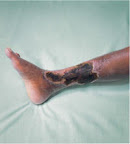 I had a little chuckle when I saw the Cosmetic Physicians getting upset at what they perceive to be the underhanded tactics of some Cosmetic Nurses.
I had a little chuckle when I saw the Cosmetic Physicians getting upset at what they perceive to be the underhanded tactics of some Cosmetic Nurses.For the benefit of those who have been living under a rock, there is a movement called Cosmetic Medicine. It is championed by the Cosmetic Physicians Society of Australasia the Australasian Society of Cosmetic Medicine and the so-called Australasian College of Cosmetic Surgery.
In a sense, many doctors practice cosmetic medicine in some way. Some skin lesions aren't likely to be cancers but are removed anyway at the patient's insistence. Some varicose veins are more a nuisance than a risk to life or limb and still get removed. Some footballers have surgery to speed their recovery and short term function when they would have healed on their own anyway. The line between what is truly deserving medicine and what is discretionary (or "cosmetic") is a very fuzzy one.
Nevertheless, cosmetic medicine is a booming industry. They like calling it Cosmetic "Medicine" because it is much more acceptable to pop a pill or have an injection than to have "Surgery" these days.
I have occasionally been caught at the dinner table between a plastic surgeon and a "cosmetic surgeon" having a good go at each other. The plastic surgeon (who, like me, undertakes a minimum of 5 or more years of basic surgical principles and practice after at least 2-3 years of general medical experience, followed by specialist surgical training in plastic surgical and reconstructive surgical techniques, and often further subspecialty fellowships locally or overseas) argues that cosmetic surgeons are not trained in the basics of surgery and surgical techniques, the care of the complex patient, the management of severe complications after surgery, and the wide range of techniques required in modern surgery.
The cosmetic surgeon (who could be from a wide range of backgrounds such as a doctor who has not undertaken any form of specialist training and just decides to set up shop, or a specialist in another field like a dermatologist or a GP who decides to extend their practice into cosmetic fields, or any of these people who choose to undertake a 1-3 year informal apprenticeship with another "cosmetic surgeon") argues that you don't need to learn how to do a microvascular anastomosis in order to inject collagen, do tummy tucks, perform liposuction, or do a boob job. Instead, they say that you need an "eye for aesthetics" which they say plastic surgeons lack, and you need experience in a dedicated cosmetic clinic where finer and more subtle work is done rather than a public hospital where plastic and reconstructive surgeons deal with major deformities and mangled patients.
Obviously I am a little biased, but cosmetic physicians are really in a much bigger mess because firstly they have failed to set common standards for themselves. This is inevitably because they come from very disparate backgrounds, and therefore any attempt to standardise a training program akin to surgical training runs the risk of rendering a whole generation of self-taught cosmetic physicians unable to meet their own standards, without very prolonged and generous "grandfathering" provisions.
Secondly, cosmetic physicians perform a wide variety of procedures, from Botox injections, Collagen or dermal filler injections, liposuction, abdominoplasties, breast enhancements, facelifts, dermabrasion, laser skin therapy, varicose veins surgery, and all sorts of procedures related only in the fact that their goal is to make you look better. There is no common set of skills. There is no fundamental "principle". There is, in short, nothing to base a training program upon other than learning a few tips and tricks here from as many other disciplines as possible. It's like taking a random factory production-line worker off the Boeing production line and saying "Why don't you ask everyone else in the factory a few questions, then we'll give you a building and you can build the new 787 Dreamliner for us?" From all the trouble that Boeing is having, perhaps that is really what is happening!
Thirdly, once you leave the moral high ground and start sniping at your own colleagues and lowering the standards of training necessary to perform these procedures, there is really no limit as to how low it can go. Cosmetic physicians standing up and saying that you don't need to be a surgeon to do cosmetic procedures is only step one. Step two (as described below) is cosmetic doctors supervising procedures done by cosmetic nurses in order to make more money. Step three (also described below) is for Cosmetic nurses standing up and saying that you don't need to be a doctor to do these procedures. Step four is beauticians standing up and saying that you don't need to be a nurse to do these procedures. Step five is some bloke in Mexico who does breast implants with a second hand diathermy machine and a spoon in his garage.
Just like Melissa Blandfort who is a travelling cosmetic nurse performing invasive procedures in patients for cosmetic purposes in various beauty salons, and without the review or approval of a doctor. Her website does not mention Botox by name, but clearly says that she performs:
Injectable wrinkle treatments
Injectable wrinkle treatments have now been in use as a cosmetic treatment for over 20 years. They relax a wrinkle causing muscles, to help improve the appearance of the wrinkle. It is extremely effective in treating crows feet, frown lines and other wrinkles caused by a muscle contraction. It is generally most effective in people aged form 25 to 55 years of age. It takes up to ten (10) days to have full effect and can last up to four (4) months.
Now, last I checked Botox and similar paralytic or neuromuscular blockade agents were prescription-only in Australia, so unless she takes a doctor around with her to write out scripts for these patients, I can't see how she can be legally injecting anybody with Botox. Her website says nothing about her being accompanied by a doctor, and I would hate to be the 20th patient receiving Botox out of her multi-dose vial that mysteriously appeared out of nowhere.
Links:
- Botox trend creating worry lines - Brisbane Times
(Click to Expand) - Four Corners 2006 Episode "Buyer of Beauty, Beware" - MUST SEE! The reporter for this episode is Jonathon Holmes who currently fronts Media Watch. Watch out of the liposuction procedure gone wrong at about 40 minutes in.
- A death after liposuction exposes busy illegal clinic - The Boston Globe, 2006
- Ex-footballer Colin Hendry's wife dies after operation to repair botched cosmetic surgery - Daily Mail UK 10th July 2009
- Choice Magazine review of Cosmetic Surgery
- Patients at risk in ugly cosmetic surgery wars - SMH, 2006









